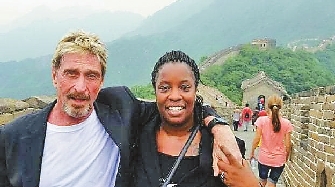

ON the run from U.S. tax authorities, tech guru John McAfee, who has announced his intention to run for the U.S. presidency, puffed a cigar aboard his towering white yacht in a Havana harbor and said he plans to use social media, where he has 1 million followers on Twitter, to campaign for the Libertarian nomination. The creator of the eponymous antivirus software in the 1980s said thousands of volunteers wearing masks depicting his face will campaign for him back home and abroad. “I don’t want to be president, I really don’t, nor could I be. Really, look at me. I can’t be president,” he said. “However, I do have a large following, and I will influence this next election.” With him on the yacht are his wife, four large dogs, two security guards and seven staff for his campaign “in exile” for the Libertarian Party presidential nomination, the 73-year-old said. He previously ran in 2016 and the attempt was thwarted by Gary Johnson, who won the party’s nomination and proceeded to win over 3 percent of the vote in the general election. McAfee said he did not pay income tax for eight years for ideological reasons and was indicted. To avoid trial, he left the United States in January for the Bahamas. He arrived in Cuba a month ago after suspecting that U.S. law enforcement was trying to extradite him from the Bahamas. McAfee is nothing if not colorful. His past includes fleeing Belize where he lived for several years after police sought him for questioning in the 2012 murder of a neighbor, meeting his wife, Janice McAfee, when she solicited him as a prostitute while he was on the run, and saying on Twitter last year that he has fathered 47 children. In Cuba, he offered his talents to the Cuban Government, vowing to develop a cryptocurrency that would allow the nation to evade U.S. sanctions. In the process of going from being known as a millionaire tech legend, to making headlines as a “person of interest” in the mysterious killing in Belize, to launching new tech companies, to running to become a presidential candidate, the one constant these days is his state of mind — his belief that people are after him. “I’m a mad man to some people because I don’t follow the normal rules,” McAfee said in an ABC News interview. “You know, the drummer that leads me is an odd drummer, but I follow the sound.” McAfee founded his antivirus company in the late 1980s as a response to early virus-like software spreading across computer networks. He invented an innovative business model of giving away his software for free for individual users while charging corporate clients. He said he wrote the antivirus program “in a day and a half” and that “4 million people were using it within a month.” He sold his shares in the software company in the mid-90s, and reportedly made US$100 million, though McAfee told ABC News his fortune was worth “much more.” But, he added, “I wasted it, like everybody who has money.” McAfee built nine homes, filling them with expensive art, furniture and oddities, such as a dinosaur skull, and he bought a fleet of planes and antique cars. He created a yoga retreat in Colorado that hosted 200 guests at a time and set up a center in New Mexico for a new sport called aero-trekking. But then the recession hit McAfee hard and in 2009, he said he liquidated his assets, and several of his properties and possessions were auctioned off. But he later said he didn’t lose all of his fortune, and had set up the auctions to try to fool the media. “I’ve had 200 lawsuits in my life because my name is John McAfee,” he told ABC News. “No, I didn’t lose everything. I wanted to stop people from trying to sue me.” So McAfee packed up and moved to Belize. When asked what made him go to the Central American country, McAfee joked, “because I’m a stupid man.” In 2009, he started a company that he said would manufacture plants from the Belize jungle into antibiotics. His lab was raided in May 2012 by the police department’s gang suppression unit on suspicion he was manufacturing methamphetamine. He said the raid was retribution for his refusal to be extorted by the government. No illegal drugs were found during the raid. He was never charged and the lab was eventually shut down. McAfee was catapulted to the headlines again in November 2012. This time Belizean authorities linked him to a more serious crime, naming him “a person of interest” in the mysterious slaying of 52-year-old Gregory Faull, a U.S. man who was McAfee’s neighbor two doors down from McAfee’s beachside compound. McAfee went into hiding, telling ABC News at the time he was afraid the authorities were trying to kill him. He has denied any involvement in Faull’s death. After being on the run for almost a month, McAfee was arrested in Guatemala by Guatemalan immigration officials for entering the country illegally. He was about to be deported back to Belize when he collapsed. McAfee later said he had faked a heart attack. “Sure, I faked it,” he said. “What would you have done?” He was never arrested or charged in connection with Faull’s death, and McAfee’s attorney in Guatemala was able to obtain a stay of deportation to Belize for him. Soon after, Guatemalan authorities deported him to Miami, where he met his future wife — Janice Dyson McAfee, a former prostitute — at a restaurant. “I instantly saw in Janice what I had been looking for my entire life,” McAfee said. “It was, I don’t know how to say it, magical,” Janice told ABC News. “He saw the hurt that was there. He saw the human in me. He thought I was worthy enough of a second chance.” McAfee and his wife later lived in Lexington, Tennessee, where he had an armed body guard with him everywhere he went and his home sported a large gun collection. “I have no fascination with guns,” he said. “I have a fascination with survival.” McAfee was the subject of filmmaker Nanette Burstein’s Showtime documentary, “Gringo,” released in 2016, which alleged McAfee was responsible for Faull’s death. One of the people featured in the film was McAfee’s property caretaker in Belize named Cassian Chavarria, who said in the film McAfee paid to have Faull killed, though the supposed hit man he named denied all wrongdoing. When asked about the documentary, McAfee laughed it all off, saying Burstein paid Chavarria to make false statements. After the film was released, McAfee posted multiple videos online with Chavarria and others who said they had lied to Burstein. Burstein told ABC News that she didn’t pay for interviews, though she said she did pay what she called a normal fee for some photos. She said McAfee paid Chavarria to recant his story. An attorney for Chavarria and three others featured in the film held a press conference in Belize City shortly after the film was released, in which they all claimed they had lied in the documentary to get money from filmmakers for their interviews. McAfee denies paying off people from the documentary to recant what they said, while Chavarria also denied at the 2016 press conference that McAfee had paid him. Even after being back in the states, McAfee hasn’t completely avoided legal trouble. In August 2015, he was pulled over in Henderson County, Tennessee, on suspicion of driving under the influence. He said he wasn’t drunk, but high on Xanax, which he said a doctor had prescribed. He pleaded guilty to a DUI, and has yet to get his suspended license back. Though he may not have the fortune he once did, McAfee does paid speaking engagements at cybertech conferences, where some in the hacking world consider him to be a visionary. McAfee is the CEO of MGT Capital, a company that invests in cybersecurity, such as a cellphone that McAfee said is the first that cannot be hacked. He also demonstrated an “NFC ring,” or “near field communications ring,” which he did not develop, but said “could have downloaded a script which took full control of your phone.” “You’re living in an age of no privacy,” he added. Given the world’s obsession with hacking, McAfee could be looking to make another comeback. “It’s an opportunity for me to speak again,” he said. “People are listening.” (SD-Agencies) | 
